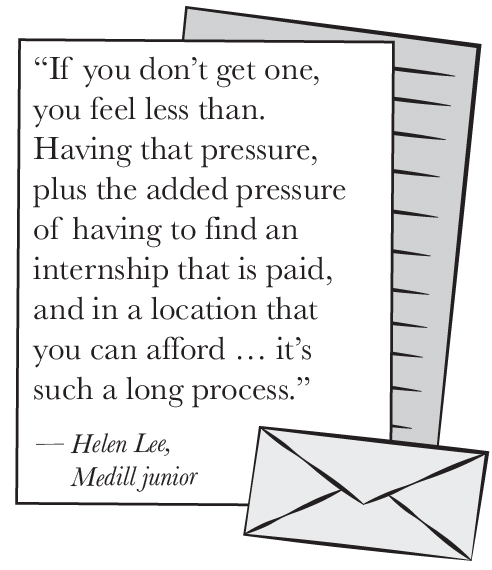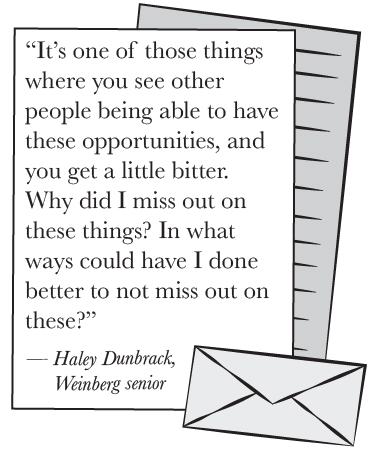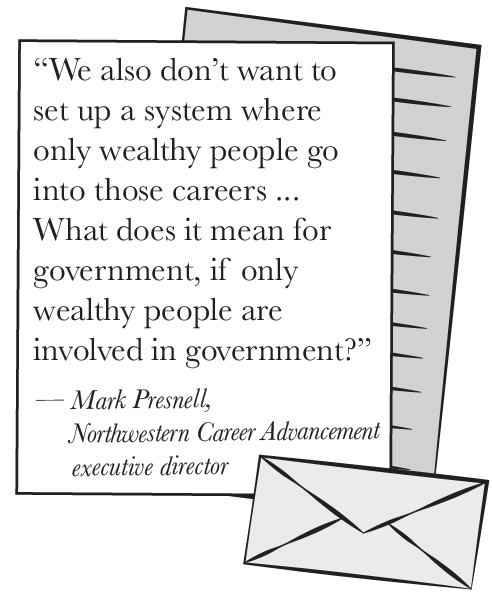In Focus: Northwestern students grapple with challenges of finding affordable internship experiences
May 8, 2017
When a prestigious publishing firm offered Weinberg senior Haley Dunbrack an internship in Los Angeles last summer, she was thrilled — until she realized she could not afford it.
Dunbrack comes from a low-income background and said she needs to make enough money during the summer to contribute to academic-year costs. The publishing internship was unpaid, and Dunbrack said funds from the Summer Internship Grant Program, which provides $3,000 to students pursuing unpaid internship opportunities in the U.S., were not enough.
“It’s one of those things where you see other people being able to have these opportunities, and you get a little bitter,” Dunbrack said. “Why did I miss out on these things? In what ways could have I done better to not miss out on these?”
The creative writing major took a position at a literary agency in Chicago instead with the help of SIGP, and also worked at her on-campus job.
Earlier this year, a media company offered Medill junior Helen Lee a low-paying internship in Washington, D.C. Instead of quickly accepting her dream position, she said she asked for an extension to figure out costs and wait to hear back from higher-paying jobs.
Meanwhile, Lee said she began waitressing at Koco Table, 720 1/2 Clark St., in addition to her course load and work-study job, in case the Washington position became her only option. She said finding an internship as a junior is stressful, especially with pressure from Northwestern to work with revered companies.
“If you don’t get one, you feel less than,” Lee said. “Having that pressure, plus the added pressure of having to find an internship that is paid, and in a location that you can afford … it’s such a long process.”
Dunbrack and Lee a re two of many Northwestern undergraduates who receive unpaid and low-paying summer internship offers, which are often associated with costs greater than some students can afford.
re two of many Northwestern undergraduates who receive unpaid and low-paying summer internship offers, which are often associated with costs greater than some students can afford.
Mark Presnell, executive director of Northwestern Career Advancement, said 70 percent of Northwestern students will have participated in some kind of unpaid internship experience by the time they graduate.
“Internships across the board are the number one thing employers look for,” Presnell said. “Only 20 percent of certain employers look for a certain major. Those are concentrated in engineering, music, maybe journalism. Most employers really recruit across every major.”
This year, 795 students applied to SIGP, compared to 702 in 2016, Presnell said. NCA announced decisions on Friday, and Presnell said the number of accepted awards will be in flux as students either decline or accept awards. He said he expects the number of grants accepted to be somewhere around 405, up from 352 last year. As the program marks its 11th year, rising interest in the grant demonstrates an increasing need among students to find funding for unpaid opportunities.
Although NU offers school-specific scholarships and SIGP grants for many who need them, such resources are limited and no University-wide fund exists for those who need supplemental funds for low-paying internships.
“The purpose of us going to school is not usually to become an academic; we’re trying to get jobs; we’re trying to get work,” Dunbrack said. “And for some people, there’s a barrier between us and the job that Northwestern is training us for. And that’s frustrating.”
Hidden early costs
McCormick senior Steffany Bahamon, a first-generation college student, said she came to Northwestern with minimal exposure to career development.
“I didn’t know what a consultant was; I didn’t know what finance was,” she said. “You don’t know how to network properly. Especially when you come in as first-year students and your friends are like, ‘Yeah, I’m going to get a great internship with XYZ person or XYZ firm, because my dad works here, or my mom’s sister works there’.”
Bahamon, the former president of Northwestern Quest Scholars Network — a low-income and first-generation student support and advocacy group on campus — said she has worked with NCA and Student Enrichment Services to invite speakers and create more events to address the career-related knowledge gap.
The percentage of low-income students at NU is increasing with the “20 by 2020” initiative, which aims to have 20 percent of incoming freshmen be Pell Grant-eligible by 2020, Bahamon said.
She said she hopes to increase awareness about career preparation for these students, which is an important step before students even consider applying to internships.
“(It’s the idea of) making sure that people are aware of the fact that preparing for your career at NU is so much more than taking different classes, and how your different identities intersect with that,” she said.
Bahamon has collaborated with SES director Kourtney Cockrell to create events like Money Matters Week, most recently held last month. The event featured speakers and workshops highlighting identity, class and income at NU.
This year’s Money Matters Week featured a panel of alumni from different backgrounds and industries speaking about career development and the importance of leveraging the Northwestern network, Cockrell said.
“When you think of cultural and social capital, first-generation students don’t always have that cultural capital,” she said. “They don’t have parents or family members that have navigated these systems, who have navigated different career paths. You hear all these terms, a JR and a practicum. But what are these things?”
McCormick assistant dean and director of career development Helen Oloroso said her office’s goal in helping low-income and first-generation students is to “level the playing field.” To do so, she said McCormick offers the Introduction to Career Development course, which has been in place for 10 years.
The zero-credit course fills each quarter, usually with a waitlist, Oloroso said. Around 400 students take it each year to learn resume and cover-letter writing, networking tips, interviewing skills and more, she said.
But the internship search requires more than writing applications and networking skills. Applying for work often includes hidden financial costs, such as professional attire, flights, conference registrations and more. From September 2015 to June 2016, Northwestern’s Career Development Fund provided 100 students with about $50,000 total to assist in these costs.
“It’s a nice balance,” Cockrell said. “(NCA) is providing the nuts-and-bolts resources, support sources. (SES) is doing more on the social, cultural capital side of things of raising awareness and exposure.”
Graphic by Max Schuman/Daily Senior Staffer
Financial strains
Communication junior Catherine Kang wants to pursue a career in entertainment marketing. Many of her friends had internships the summer after freshman year, which Kang said made her feel pressured to find such an experience last summer.
“As a lower-class, middle-income student being surrounded by people with those connections, that was a shock to me,” she said. “A good thing about the culture is that it makes Northwestern students really viable for full-time jobs. There’s a big downside to it: It’s very competitive.”
Sophomore year, Kang received two offers in New York City: one unpaid and one that paid minimum wage. She said she chose the paid option and covered housing costs with the aid of a supplemental School of Communication internship award.
The school offers three $2,000 to $3,000 awards each year for both unpaid and paid internships, unlike SIGP and other school-specific funds. These include the Medill Fellowship Program, which provides a limited number of grants for unpaid summer internships, and Summer Undergraduate Research Grants run through the Office of Undergraduate Research.
Even with a paid internship and the award, however, Kang said she broke even that summer.
“Ice cream was eight dollars,” she said. “The overall price of going was expensive. … I think it’s worth it. I’m going to make some financial sacrifice, but not a huge amount to do what I want to do. Getting the experience I want — that involves taking a job that pays 10 or 12 dollars an hour.”
Lee, the Medill junior, said she did not even apply for internships in New York City or LA for this upcoming summer because she knew she would not be able to afford the cost of living. Many of the best marketing internships to advance her career exist in these cities, Lee said.
She added Northwestern’s environment can get “awkward” because socioeconomic status often becomes a topic people avoid when discussing summer experiences.
“Chances are, a couple of your really good friends are going to be one of those people that can afford to go to New York City and have their parents pay for it,” Lee said. “You don’t want to voice those concerns to them because it’s going to make them feel awkward.”
Weinberg junior Bailey Pleva did not have the opportunity to go to New York like Kang and said he felt jealous seeing his friends go to the city for job opportunities.
Pleva has worked up to 30 hours a week on top of classes to contribute to alleviating his tuition cost, he said. When he was offered a low-paying marketing position in Washington, D.C., he decided not to take it because he would not have made enough money for the following academic year, he said.
He considered going back home to Milwaukee, where he said he could make money from bartending.
“But it wouldn’t have been experience, which helps me get my foot in the door,” Pleva said.
Bahamon said there is a need for a supplemental grant for students who take minimum wage jobs, though she emphasized the value and importance of SIGP.
“I think SIGP is a great program,” she said. “I know sometimes it can be difficult to get. I wish the funds could be expanded or if there was a cost-of-living adjustment. … You might be able to pay for food or utilities, but housing is going to take a bite out of your check.”
Leveling the playing field
In 2007, its first year, SIGP received 90 applications and gave out 10 awards, according to NCA data. The number of applications has increased each year, reaching 795 in 2017.
The program awards $3,000 grants, with the exception of Buffett International SIGP awards, which are $6,000 each. Students who receive SIGP must also complete career exploration and donor appreciation activities throughout the summer and at the end of their experience.
Graphic by Max Schuman/Daily Senior Staffer
Weinberg junior Chelsea Hammersmith used SIGP last summer for an internship with the Chicago nonprofit Open Books, working at a day camp where middle school students wrote their own fantasy novels. Hammersmith also worked a few hours each week at University Library, she said.
The Carol Stream, Illinois, native used the funds for housing, food and public transportation. Because she did not need to buy a plane ticket, she was able to save up a portion for the following academic year, she said.
“But it wasn’t as if I was making money from a job,” Hammersmith said. “That was something that for me financially was okay. I would’ve liked to make more money to save, but that was the situation last summer.”
This summer for Hammersmith is slightly different, the American studies major said, as she will use SIGP to work at a congressional office in Washington, D.C.
Because of the expensive lifestyle of Washington, Hammersmith said she will not be able to save up any of the grant to use during the academic year.
“It’s very much part of the culture, especially in government and in D.C.,” she said. “It’s expected you work an unpaid internship to get your foot in the door, which is something I love about SIGP — it’s (filling) a very visible and prevalent need.”
Hammersmith said expanding SIGP is one of the best things the University is doing to help low-income students.
NU created SIGP partly to offer funds to students seeking traditionally unpaid internship experiences with nonprofits, international programs, government, arts companies and media outlets, Presnell said.
“We also don’t want to set up a system where only wealthy people go into those careers,” he said. “What does that mean for, let’s take the gorilla in the room. What does it mean for government, if only wealthy people are involved in government?”
Presnell said he hopes to meet the full need of SIGP applicants so that administrators can begin looking at ways to address situations in which students need supplemental funds for living expenses.
Cockrell, the SES director, noted the importance of donors and said both SES and SIGP would not exist without them.
“Donors are so willing and happy to meet the gaps and the need,” she said. “They want the ‘20 by 2020’ initiative to be successful, and they want to make sure it’s an equitable experience.”
Built-in opportunities
Monday through Thursday, SESP junior Imani Wilson works with high school students at Lincoln Park High School’s College and Career Lab. She is completing her SESP practicum, an experience similar to other built-in programs such as Medill’s Journalism Residency and McCormick’s Cooperative Engineering Education program.
All SESP students are required to complete practicum or the summer Field Studies Program — an internship, hands-on research or community service typically done during junior year — to graduate.
“SESP takes a real view of, ‘learning is more than just theoretical’,” said Nathan Frideres, the school’s Field Studies Program coordinator. “We want students to learn by doing and put theory into practice, (so) that they’re really able to analyze and make meaning out of their experience.”
Frideres said during the academic year, students complete the practicum requirement in Chicago. In the summer, they may go to Washington, D.C., San Francisco or Chicago, he added.
Wilson, a social policy major, said her practicum at Lincoln Park High School is unpaid, like most practicum experiences for students in her major. Pay varies across SESP majors, she said, especially for learning and organizational change majors who may pursue consulting at high-paying companies.
Around one-third of SESP practicums are paid, Frideres said. It depends on where an organization is at financially, as many of them are nonprofits, he added. The SESP Munger Family Practicum/Student Teaching Assistance Fund helps students with added costs throughout the program, he said.
Because Wilson had to cut down on her work-study job hours, she said she obtained a CTA pass through this fund. However, Wilson said she thinks SESP could improve the resources it offers to students.
“SESP is aware of the fact that practicum can be expensive for students, but I still feel like they can do a lot more,” she said. “Even Medill students get a stipend, which is not a lot, but it’s still a stipend.”
There are no SESP scholarships or travel stipends for summer field experiences in Chicago, San Francisco or Washington, D.C., Frideres said.
“We’d prefer them to not (take on a second job),” he said. “We just don’t ask.”
Frideres said the school aims instead to start the financial conversation about practicum and field studies as early as the beginning of sophomore year. Susan Olson, SESP assistant dean for student affairs, said starting this conversation early helps students prepare for upcoming costs.
“No one wants to be the candle burned at both ends and to have the stress of, ‘Oh, I can’t pay my rent, because I hadn’t thought through about how it was going to work out’,” Olson said.
Like SESP, Medill put a professional experience requirement into its curriculum because internships are “substantial,” said Medill Dean Brad Hamm. For JR, students complete a quarter of work at a media organization for credit as part of the journalism major.
Hamm said the program is enhanced by the relationships Medill has built with certain media outlets. When he became dean in 2012, all of the JR experiences were unpaid, he added.
Today, about 50 percent of JR sites are paid, while the others are stipend-based, he said. Many of the sites are in New York City, Los Angeles and Washington, D.C.
“Scholarships are available for students with high financial need and for other students as well,” Hamm said.
Jerry Donahue, assistant director of Medill Career Services, said the school has a limited number of summer grants through the Medill Fellowship Program, depending on donor action.
Hamm said Medill is still trying to fund the entirety of JR experiences, and the school is not focusing on raising money for summer internship grants at this point.
“We’re trying to fund the internships that we have control over,” he said. “That’s our top priority. … That is our internship model.”
Making it work
Bienen senior Landon Hegedus took lessons from five different saxophone musicians in New York City the summer between his sophomore and junior years, with the help of SIGP.
“I had a fantasy about this experience,” Hegedus said. “But I didn’t have a way to pay for it, if not for SIGP.”
He gedus, who said he receives a significant amount of financial aid, used the grant for rent, groceries and lessons. He cut costs because he was able to split a room in a Harlem apartment with his friend, he said, and he cooked most of his own meals.
gedus, who said he receives a significant amount of financial aid, used the grant for rent, groceries and lessons. He cut costs because he was able to split a room in a Harlem apartment with his friend, he said, and he cooked most of his own meals.
“Because I budgeted pretty well, I was able to live within my means,” Hegedus said. “It was a dream come true.”
Cockrell and Presnell occasionally work with the Office of Undergraduate Financial Aid if they speak to a student who wants a summer experience but is blocked by a summer earnings contribution. Cockrell said this expected contribution can be a barrier for students receiving $3,000 for a summer. On a case-by-case basis, she and Presnell contact the financial aid office to see if the contribution could be waived, Cockrell said.
Donahue said he sees Medill students use cost-cutting strategies to make summer internship experiences work. He added students often find low-cost housing in big cities or share spaces with multiple roommates.
Before putting opportunities on Medillink, Medill’s career portal, Donahue said he sometimes speaks with employers who offer unpaid positions.
“The applicants that apply for very prominent internships, they’re applying because if they got it, they could take it,” he said. “For people who can’t afford it, if it’s a dream job, they have to decide … They think ahead on how they can save money.”
Looking back, Dunbrack, the Weinberg senior, said each year it became more difficult as she watched other students take coveted internship opportunities she could not afford.
“(The University) prides itself on having these amazing alumni and these great networks that are really successful,” Dunbrack said. “Northwestern can do more to help all of their students be successful.”
Email: [email protected]
Twitter: @amandasvachula

